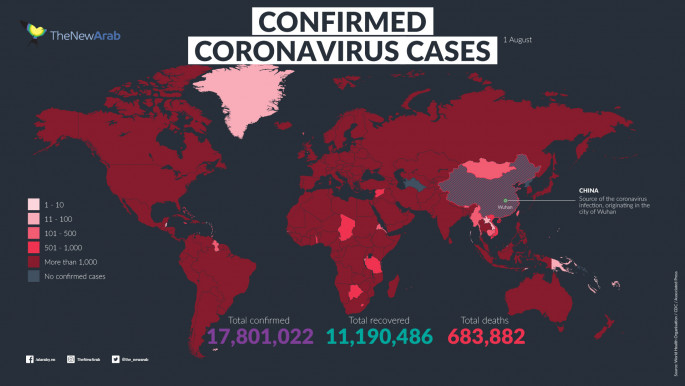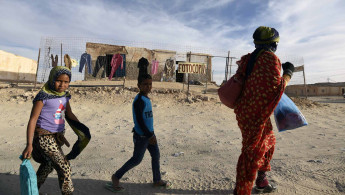Fears of devastating coronavirus outbreak among Sahrawi refugees as new cases detected near Algeria camps
Nine Covid-19 cases have been detected in Algeria’s Tindouf province, where tens of thousands of Sahrawi refugees live in camps.
3 min read
The camps' health centers are ill-equipped to deal with an outbreak of the virus [AFP]
More than 170,000 Sahrawi refugees are facing an "imminent" coronavirus outbreak after new cases of the Covid-19 illness were confirmed close to refugee camps in Algeria, Oxfam has warned.
Nine coronavirus cases have recently been confirmed in Algeria's western Tindouf province, which borders Morocco, Mauritania and the disputed Western Sahara territory, hosting tens of thousands of Sahrawi refugees.
"The new confirmed cases are very close to the camps, which means the risk of an outbreak is now imminent and would be disastrous for the refugee population – one that has already suffered four decades of conflict," said Haissam Minkara, Oxfam's country director in Algeria.
The risk of an outbreak is "incredibly high" and could be devestating for the refugee camp population, Oxfam said on Friday. Camp residents live in extremely close quarters with no possibility of social distancing, and there is a widespread prevelance of chronic health conditions that can complicate Covid-19 symptoms, including diabetes.
Health centres in the Sahrawi refugee camps are already underequipped, with a shortage of hospital beds and protective equipment for staff. Additionally, the camps lack even a single ventilator.
 |
| [Click to enlarge] |
Local authorities and aid organisations operating in the camps have taken measures to prevent the spread of the virus but those measures have placed the already vulnerable refugee population under alternate risks.
Authorities have shuttered non-essential businesses and prohibited travel between different camps, while aid organisations have temporarily halted activities.
"The camps are isolated both geographically and economically, and with most of the already minimal economic activities in the camps halted as a result of the Covid-19 restrictions, refugees' ability to purchase food and essential hygiene items is increasingly limited," Oxfam said.
In response, the humanitarian organisation said it was procuring protective equipment and hygiene items for the camps' health centres and workers, as well as installing public hand-washing units in the camps.
Oxfam has called on the international community to help raise $14 million to fund its efforts to prevent the spread of the virus and mitigate a potential outbreak.
"The Sahrawi refugee crisis has been overlooked for over four decades and now, more than ever, the stakes couldn’t be higher for those already left behind by the international community," Minkara said.
Algeria has hosted tens of thousands of Sahrawi refugees since 1975, when armed conflict broke out in the Western Sahara after the withdrawal of Spanish colonial forces, who granted administrative control over the region to Morocco and Mauritania.
Indigenous Sahrawi activists formed the Polisario Front to fight for self-determination. Mauritania pulled out of the conflict in 1979 and a ceasefire was eventually signed in 1991 between the Polisario Front and Morocco, which now occupies around three-quarters of the Western Sahara.
Negotiations over a final political settlement have been at a stalemate for well over a decade.
Oxfam states that more than 170,000 Sahrawi refugees live in the Tindouf camps but the number of refugees present there is highly contentious, with the UNHCR estimating around 90,000 while Morocco claims there are 50,000.
Algeria has reported more than 5,500 confirmed Covid-19 cases to date, including 494 deaths. The United Nations Mission for the Referendum in Western Sahara (MINOSUR) has confirmed six cases of the virus in Moroccan-administered Western Sahara.
Follow us on Facebook, Twitter and Instagram to stay connected





 Follow the Middle East's top stories in English at The New Arab on Google News
Follow the Middle East's top stories in English at The New Arab on Google News
![The UAE is widely suspected of arming the RSF militia [Getty]](/sites/default/files/styles/image_330x185/public/2024-11/GettyImages-472529908.jpg?h=69f2b9d0&itok=Yauw3YTG)
![Netanyahu furiously denounced the ICC [Getty]](/sites/default/files/styles/image_330x185/public/2024-11/GettyImages-2169352575.jpg?h=199d8c1f&itok=-vRiruf5)
![Both Hamas and the Palestinian Authority welcomed the ICC arrest warrants [Getty]](/sites/default/files/styles/image_330x185/public/2024-11/GettyImages-2178351173.jpg?h=199d8c1f&itok=TV858iVg)